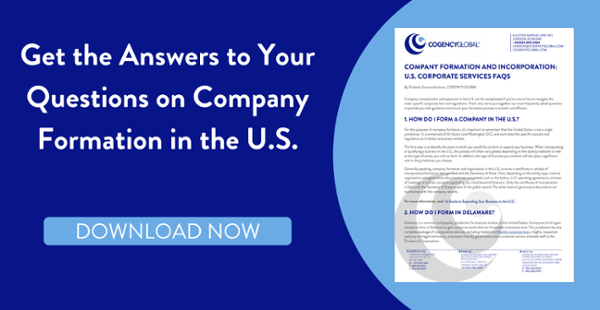 What this is: Overseas companies looking to set up a business in the United States often choose to do so in Delaware because of the state’s business-friendly legal system and because it is considered to be one of the most developed jurisprudences in terms of company law within the US.
What this is: Overseas companies looking to set up a business in the United States often choose to do so in Delaware because of the state’s business-friendly legal system and because it is considered to be one of the most developed jurisprudences in terms of company law within the US.
What this means: If you choose to form in Delaware, you can expect a quick turnaround time, an excellent body of court decision-related knowledge, and a fast-paced and business-like environment at the Delaware Secretary of State. Read on to learn about different options for filing in this jurisdiction and what it entails.
If you are looking for information on how to form your business in the US, which state to choose and how US entity formation differs from forming elsewhere, read this article first: How To Expand Your Business in the US.
Steps to Form a Company in Delaware
The first important step is to confirm with your legal advisor that forming an entity in Delaware makes the most sense in terms of the tax and legal implications for your international business. Your US advisors will then provide guidance on a number of important matters, including what type of entity to form in Delaware, for example a Corporation or Limited Liability Company (“LLC”). After you have partnered with your US advisors and have a business plan in place, company formation in Delaware is pretty straightforward.
It can take as little as 24 hours to form any kind of entity if you have all the prerequisite information. For an international client, this is a major point of differentiation; outside the US, it would generally take at least a week.
As a foreign company conducting business in the US, you have the option of setting up a new company in the State of Delaware, independent of your non-US entity (known as 'incorporation' or 'formation') or you may decide to register or qualify your ‘non-US’ business entity in Delaware (known as ‘qualification’). Both incorporation and qualification processes are relatively simple – this requires filing a Certificate of Formation, Certificate of Incorporation or Qualification Certificate of a Foreign Corporation, as the case may be, with the Delaware Secretary of State. You can choose either route based on your business goals in the US and advice of your legal and tax advisors.
If your US legal or tax advisor suggests that you form a domestic Corporation or LLC in Delaware, it is highly likely that they will also advise that you register/qualify that company to do business in how ever many other US states you plan to conduct business in. For instance, if your ultimate purpose is to do business in New York, your advisors may deem for a number of reasons and after consulting with you, that forming a Delaware domestic corporation is the right domicile. You would then typically also register/qualify the Delaware corporation to do business in the State of New York.
Another of the advantages to forming in Delaware is that there is no residency requirement for directors, officers or stockholders. Unlike many European jurisdictions which require an EU based director, Delaware has no such requirements. To invest in or manage a Delaware entity, you do not have to be a resident of the United States.
There is also no minimum capital requirement, so you do not need to bring in initial foreign investment for the purposes of incorporating an entity in Delaware.
Basic Filing Considerations for Forming or Qualifying a Company
To form an entity in Delaware, you will file either a Certificate of Incorporation for a Corporation or a Certificate of Formation for an LLC. Depending on the type of entity (corporation or LLC), there will be internal organisation documents required or recommended once the company has been formed with the Secretary of State. Unlike European companies, these organisation documents may not be available publicly.
If you are qualifying a non-US entity to do business, you will need to provide details about your existing non-US entity to show it is in good standing. For example, if a UK company wants to register to do business in Delaware, they will have to show their business is in good standing in the UK, in addition to filing the Certificate of Qualification. Once filed, you can expect a quick turnaround.
You will need to appoint a registered agent on behalf of the company to be a contact point for the Secretary of State. This will be the place where all legal process and statutory notices from the state would be sent in the US and then forwarded to a contact at your company.
Delaware corporations are required to file an annual report every year. In addition, they must pay annual franchise tax (a payment to the Secretary of State), which differs depending on the type of entity. A registered agent is usually be able to take care of these requirements for you as well. Note that Delaware limited liability companies do not have to file annual reports, but do need to pay an annual tax.
If you need assistance with international company formation and subsidiary management, you can find out more on our website, or click below to download our Corporate Services FAQ.
This content is provided for informational purposes only and should not be considered, or relied upon, as legal advice.


